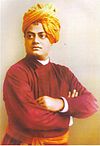Bhupendranath Datta
| Bhupendranath Datta | |
|---|---|
 |
|
| Born | 4 September 1880 |
| Died | Script error: The function "death_date_and_age" does not exist. |
| Nationality | Indian |
| Relatives | Swami Vivekananda (elder brother) |
Bhupendranath Datta (4 September 1880 – 25 December 1961)[1] was an Indian revolutionary and later a noted sociologist. In his youth, he was closely associated with the Jugantar movement, serving as the editor of Jugantar Patrika till his arrest and imprisonment in 1907. In his later revolutionary career, he was privy to the Indo-German Conspiracy. His elder brother was Swami Vivekananda. The Asiatic Society today holds the Dr. Bhupendranath Datta memorial lecture in his honour. Lua error in package.lua at line 80: module 'strict' not found. Datta was a writer too. He wrote several books on Indian culture and society. In his book Swami Vivekananda, Patriot-prophet he presented the socialist views of Swami Vivekananda.[2]
Contents
Early life and education

Datta was born on 4 September 1880 in Kolkata (then known as Calcutta). His parents were Vishwanath Datta and Bhuvaneshwari Datta. He had two elder brothers Narendranath Datta (later known as Swami Vivekananda) and Mahendranath Datta. Vishwanath Datta was an attorney of Calcutta High Court and Bhuvaneshwari Devi was a housewife.[3] Datta was enrolled in Ishwar Chandra Vidyasagar's Metropolitan Institution from where he passed entrance examination. In his youth, he joined Brahmo Samaj led by Keshub Chandra Sen and Debendranath Tagore. Here he met Sivanath Sastri who deeply influenced him. Datta's religious and social beliefs were shaped by Brahmo Samaj which included belief in a caste-less society, in a single God and revolts against superstitions.[4]
Revolutionary activities
In India
Datta decided to join Indian independence movement, and joined Bengal Revolutionary Society formed by Pramathanath Mitra in 1902. In 1906 he became the editor of the newspaper Jugantar Patrika. This newspaper was the mouthpiece of the Revolutionary Party of Bengal. In this period he became a close associate of Sri Aurobindo and Barindra Ghosh.[5]
In 1907, Datta was arrested by British police with the charge of sedition and was sentenced to one year's imprisonment.[4][6]
In USA
After release in 1908 he leaves India in disguise and goes to USA. In the USA, he stays at India House.[4][6] Here he completed his post-graduation studies too and obtained an M.A. degree from Brown University.[6]
In Germany
Datta joined Ghadar Party of California and there he studied about socialism and communism.[4] During World War I, he went to Germany and started revolutionary and political activities there. In 1916 he became the secretary of Indian Independence Committee in Berlin.[6] He remained the secretary of this organisation till 1918. He took memberships of German Anthropological Society in 1920 and German Asiatic Society in 1924.[4]
In 1921 Datta went to Moscow to join Comintern. Manabendra Nath Roy and Birendranath Dasgupta also attended this year's Commintren. During the Commintren Datta presented Vladimir Lenin a research paper on political condition of contemporary India. He obtained a doctorate degree from the University of Hamburg in 1923.[4]
Back in India
Then he returned to India and decided to join Indian National Congress.[6] He became members of Bengal Regional Congress in 1927—28 and All India Congress Committee in 1929. In the annual conference of Indian National Congress organised in Karachi in 1930, he proposed a fundamental right for Indian farmers and had it accepted by Congress Committee led by Jawaharlal Nehru. He chaired two All India Trade Union Congress' annual conference. He was arrested for his political activities.[4]
Literary works
Datta wrote books on different subjects like sociology, history, politics etc. He was a linguist and wrote books in Bengali, Hindi, English, German, Iranian. Few of his notable books are—[4]
- Lua error in package.lua at line 80: module 'strict' not found. (Bengali)
- Lua error in package.lua at line 80: module 'strict' not found. (Bengali)
- Lua error in package.lua at line 80: module 'strict' not found. (Bengali)
- Lua error in package.lua at line 80: module 'strict' not found.
- Lua error in package.lua at line 80: module 'strict' not found.
- Lua error in package.lua at line 80: module 'strict' not found.
References
- ↑ Lua error in package.lua at line 80: module 'strict' not found.
- ↑ 2.0 2.1 Lua error in package.lua at line 80: module 'strict' not found.
- ↑ Lua error in package.lua at line 80: module 'strict' not found.
- ↑ 4.0 4.1 4.2 4.3 4.4 4.5 4.6 4.7 Lua error in package.lua at line 80: module 'strict' not found.
- ↑ Lua error in package.lua at line 80: module 'strict' not found.
- ↑ 6.0 6.1 6.2 6.3 6.4 Lua error in package.lua at line 80: module 'strict' not found.
Lua error in package.lua at line 80: module 'strict' not found. Lua error in package.lua at line 80: module 'strict' not found.
- EngvarB from July 2013
- Use dmy dates from July 2013
- Articles with hCards
- Articles with Bengali-language external links
- Anushilan Samiti
- Bengali Hindus
- 1880 births
- 1961 deaths
- Indian sociologists
- Revolutionary movement for Indian independence
- Bengali people
- Indian revolutionaries
- University of Calcutta alumni
- Hindu–German Conspiracy
- Indian National Congress politicians
- Hindi-language writers
- Bengali-language writers
- English-language writers from India
- Indian independence activists from Bengal
- Prisoners and detainees of British India
- Swami Vivekananda
- Hindu writers
